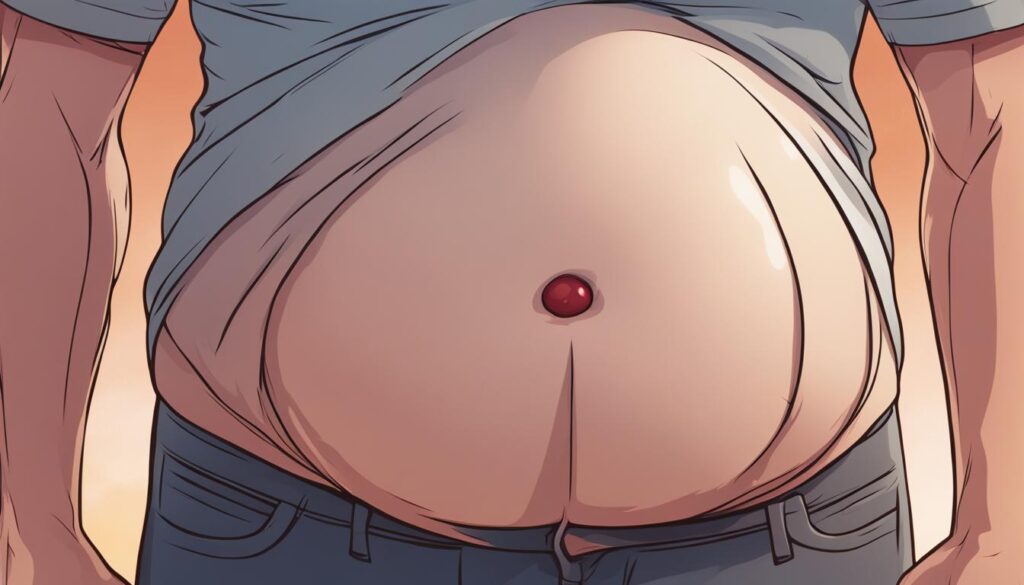After undergoing an abortion, many individuals wonder how to manage their weight and achieve a healthy lifestyle. The hormonal changes that occur during pregnancy can affect weight, even after the termination of a pregnancy. Factors such as metabolism, hormone levels, stress, and lifestyle choices can impact weight changes after an abortion.
Weight loss can occur after an abortion due to the absence of pregnancy and reduced water retention. However, weight gain after an abortion can also occur due to emotional effects, hormonal fluctuations, and increased appetite.
It’s important to be aware of the common post-abortion side effects, such as bloating, abdominal aches, breast swelling, and tenderness. These side effects are typically temporary and can be managed with proper care and medical advice.
In this article, I will explore the hormonal fluctuations and weight changes that can occur after an abortion, as well as the common side effects to be mindful of. I will also discuss the emotional impact of abortion and provide tips for weight management and faster recovery through proper nutrition and support.
Key Takeaways:
- Weight changes after an abortion can be influenced by hormonal fluctuations, stress, and lifestyle choices.
- Weight loss after an abortion can occur due to the absence of pregnancy and reduced water retention.
- Weight gain after an abortion can be triggered by emotional effects, hormonal fluctuations, and increased appetite.
- Bloating, abdominal aches, breast swelling, and tenderness are common side effects after an abortion but are usually temporary.
- Managing emotional stress, seeking support, and following a proper diet can aid in weight management and faster recovery post-abortion.
Hormonal Fluctuations and Weight Changes
After an abortion, hormonal fluctuations can take some time to return to normal levels. These fluctuations can have an impact on weight, leading to both weight loss and weight gain. Understanding how these hormonal changes affect your body can help you manage your weight effectively.
Weight Loss: One common effect of hormonal fluctuations after an abortion is weight loss. This can occur due to the absence of pregnancy and the reduction in water retention that often accompanies it. Additionally, nausea associated with pregnancy hormones can contribute to a decrease in appetite, leading to further weight loss.
Weight Gain: On the other hand, hormonal fluctuations can also cause weight gain after an abortion. Stress and emotional effects can play a role in weight gain, as they can trigger a response in the body that increases appetite and leads to overeating. Hormonal fluctuations can further exacerbate this by influencing your appetite.
To effectively manage your weight after an abortion, it’s important to be aware of these hormonal fluctuations and their potential impact. Consulting a healthcare professional can provide valuable guidance and support in navigating any significant weight changes. They can help you develop a personalized plan to achieve your weight management goals.
| Hormonal Fluctuations and Weight Changes | Effects |
|---|---|
| Weight Loss | – Absence of pregnancy – Reduced water retention – Nausea associated with pregnancy hormones |
| Weight Gain | – Stress and emotional effects – Hormonal fluctuations increasing appetite |
Consulting a healthcare professional for concerns about significant weight changes is crucial in ensuring your overall well-being. They can provide the support and guidance you need to navigate the complexities of post-abortion weight management.
Bloating and Abdominal Aches

After an abortion, it is common to experience bloating and abdominal aches as part of the recovery process. These side effects are primarily caused by the small amount of blood or uterine contents being expelled through the fallopian tubes. This expulsion can irritate the bowels and lead to bloating, which typically resolves within a week.
Additionally, cramping is a common occurrence after an abortion and serves the purpose of helping the uterus return to its usual size. To alleviate cramps, pain medications can be taken, and it is recommended to rest and apply heat to the abdominal area. These measures can provide relief and support your body as it adjusts post-abortion.
It is important to note that while bloating and abdominal aches are expected after an abortion, severe symptoms such as fever, excessive bleeding, or intense cramping should not be ignored. These could indicate infection or complications and should prompt you to seek immediate medical advice.
| Bloating and Abdominal Aches | Management |
|---|---|
| Bloating | Resolves within a week |
| Cramping | Relieved with pain medications, rest, and heat |
| Severe Symptoms | Seek immediate medical advice |
Breast Swelling and Tenderness
After an abortion, it is common for women to experience breast swelling and tenderness. These side effects can last for up to two weeks post-abortion and are a result of hormonal changes in the body. If the pregnancy had progressed to a point of milk production, women may also experience firmness of the breasts and milk leakage.
To alleviate breast swelling and tenderness, there are a few methods that can be helpful. Pain relief medications can provide temporary relief, while applying ice packs to the breasts can help reduce inflammation. Wearing a supportive bra or compression top can also provide comfort and alleviate discomfort.
If you experience any significant changes or have concerns about breast swelling or tenderness after an abortion, it is important to consult a healthcare professional. They can provide guidance and address any issues that arise during your recovery.
Common Side Effects After Abortion

After undergoing an abortion, it is common to experience certain side effects as your body recovers. It’s important to be aware of these common side effects, which may include bleeding, discharge, nausea, and fatigue.
One of the most common side effects is bleeding, which can last for up to a month. Initially, the bleeding may be heavy but should gradually decrease over time. It’s normal for the color of the blood to change from bright red to a yellow or brown-colored discharge as the healing process progresses.
Nausea and fatigue are also common after an abortion. You may feel nauseous for a few days following the procedure, and it can be helpful to rest and take it easy during this time. Fatigue is another common side effect, so it’s important to listen to your body and get plenty of rest as you recover.
It’s important to note that every individual may experience these side effects differently. It’s essential to follow your healthcare provider’s instructions and take any prescribed pain medications as directed. Resting, staying hydrated, and practicing self-care can also aid in the recovery process.
Common Side Effects After Abortion:
| Side Effect | Description |
|---|---|
| Bleeding | Can last up to a month, may turn into yellow or brown-colored discharge |
| Nausea | May be experienced for a few days after the procedure |
| Fatigue | Feeling tired or low on energy |
When to Seek Medical Help
After an abortion, it’s crucial to know when to seek medical help. While some discomfort and side effects are normal, certain symptoms may require immediate attention from a healthcare professional.
- Worsening symptoms: If your post-abortion symptoms are getting worse instead of improving over time, it’s important to consult with a doctor or seek medical advice.
- Fever: A persistent fever after an abortion could indicate an infection or other complications. It’s essential to reach out to a healthcare professional if you experience a high temperature.
- Severe pain: While mild cramping and discomfort are common after an abortion, severe or unmanageable pain should be evaluated by a medical professional.
- Excessive bleeding: Heavy or prolonged bleeding, passing large blood clots, or bleeding that lasts for more than 10 days may require immediate medical attention.
“If you experience worsening symptoms, have a persistent fever, severe pain, or excessive bleeding after an abortion, it’s important to consult with a healthcare professional.”
In addition, certain conditions warrant a prompt visit to a doctor or healthcare professional:
- Constipation: If you are experiencing constipation after an abortion, it may be a sign of a complication that requires medical evaluation.
- Symptoms of a urinary tract infection (UTI): If you experience symptoms such as frequent urination, pain or a burning sensation during urination, or cloudy or strong-smelling urine, it’s important to seek medical advice as it may indicate a UTI.
- Abnormal discharge: Pus-like discharge with a strong odor or any other abnormal discharge should be evaluated by a healthcare professional as it may indicate an infection or complication.
- Feeling still pregnant 2 weeks after the abortion: If you still feel pregnant, including symptoms like breast tenderness or abdominal bloating, it’s important to seek medical help for further evaluation.
- No bleeding after a medical abortion: If you have undergone a medical abortion and there is no bleeding, it’s important to consult a healthcare professional to ensure that the procedure was successful.
Remember, seeking medical advice and attention is essential when experiencing any concerning symptoms or complications after an abortion. Healthcare professionals are equipped to provide appropriate guidance and support for your specific situation.
Emotional Impact and Weight Management
Weight management after an abortion is not just about physical changes but also involves addressing the emotional impact of the experience. Emotional support plays a crucial role in navigating the challenges of post-abortion weight management. Seeking counseling and support from healthcare professionals or dedicated organizations can provide the necessary guidance and coping mechanisms to deal with mental trauma, depression, and stress, which may contribute to weight gain or hinder weight loss efforts.
Managing stress is a key component of post-abortion weight management. High levels of stress can disrupt hormonal balance and affect eating habits, leading to weight gain. Engaging in stress management techniques such as meditation, deep breathing exercises, and engaging in hobbies or activities that promote relaxation can help reduce stress levels and contribute to weight management.
Practicing self-care is equally important in the journey of post-abortion weight management. Taking care of one’s emotional well-being through activities such as practicing mindfulness, engaging in regular exercise, and setting aside time for self-reflection and relaxation can help individuals maintain a positive mindset, reduce emotional eating, and support overall weight management efforts.
A balanced and healthy diet, combined with regular exercise, is crucial for post-abortion weight management. Opting for nutrient-dense foods and avoiding highly processed or sugary snacks can provide the body with the necessary fuel while supporting weight loss. Incorporating a variety of fruits, vegetables, lean proteins, and whole grains can help individuals maintain a healthy weight and promote overall well-being.
It’s essential to recognize that weight loss after an abortion takes time and consistency. Each individual’s journey is unique, and it’s important to be patient and kind to oneself throughout the process. Seeking support, whether through counseling, support groups, or loved ones, can provide encouragement, understanding, and guidance in achieving post-abortion weight management goals.
Nutrition After Abortion for Fast Recovery

Nutrition plays a significant role in fast recovery after an abortion. By creating a well-planned meal plan, you can provide your body with the necessary energy and nutrients to aid in the healing process.
One essential aspect of post-abortion nutrition is maintaining adequate iron levels. Iron-rich foods such as spinach, mint, and broccoli can help replenish hemoglobin levels and support the production of red blood cells, promoting overall recovery.
In addition to iron, it’s crucial to consume a variety of vitamins to bolster your immune system and facilitate the healing process. While solid foods may be challenging to digest immediately after an abortion, fluids like water, teas, and soups can be excellent sources of vitamins.
When planning your meals, it’s essential to listen to your body. Avoid foods that make you feel sick or uncomfortable and instead focus on consuming nutrient-dense options. However, remember that it’s okay to indulge in comfort foods occasionally, as they can provide emotional support during the recovery period.
By prioritizing proper nutrition, you can promote a fast and successful recovery after an abortion.
Omega-3 and Proteins for Recovery

When it comes to recovery after an abortion, incorporating omega-3 fatty acids and proteins into your diet can be highly beneficial. Omega-3 fatty acids, found abundantly in fish and seafood, offer a wide range of advantages, including lowering harmful cholesterol levels, fighting depression, and protecting the heart. Fish such as salmon, oysters, and sardines are excellent sources of omega-3 fatty acids, making them ideal choices for post-abortion recovery.
Proteins are essential for body repair, blood clotting, and hormone balancing. Including protein-rich foods in your post-abortion diet can aid in the recovery process. Dairy products, eggs, lean meats, and poultry are all excellent sources of proteins that can promote healing and provide the necessary building blocks for the body to repair itself.
| Omega-3 Rich Foods | Protein-Rich Foods |
|---|---|
| Salmon | Eggs |
| Oysters | Lean Meats |
| Sardines | Poultry |
By incorporating omega-3 rich foods and protein sources into your post-abortion diet, you can provide your body with the necessary nutrients for recovery and promote optimal healing. Remember to consult with your healthcare professional or a registered dietitian for personalized dietary recommendations based on your specific needs and preferences.
Boosting the Recovery Process

In addition to following a proper post-abortion diet, boosting the recovery process requires stress management and emotional support. Talking openly about concerns and feelings with loved ones, seeking counseling or therapy, and finding support in friends or support groups can help in the healing process.
Hydration is also important for removing toxins from the body and supporting overall recovery. Ensuring an adequate intake of water throughout the day helps maintain proper bodily functions and aids in the healing process.
Seeking professional guidance through counseling can provide invaluable support and guidance, offering tools for managing stress, addressing emotional trauma, and fostering personal growth.
Remember to take care of yourself both physically and emotionally during this time. Patience and self-compassion are essential as you navigate the recovery process. By prioritizing stress management, emotional support, open communication, counseling, and hydration, you can enhance your recovery and promote overall well-being.
| Ways to Boost Recovery Process | Benefits |
|---|---|
| Talking openly about concerns and feelings | Provides emotional release and fosters a sense of support |
| Seeking counseling or therapy | Offers professional guidance and tools for managing stress and addressing emotional trauma |
| Joining support groups | Connects you with individuals who have shared experiences, providing a sense of belonging and understanding |
| Staying hydrated | Supports overall bodily function and aids in the elimination of toxins |
Conclusion
Weight gain and weight loss are common experiences after an abortion, influenced by hormonal changes and emotional effects. While weight gain may occur due to these factors, it is possible to achieve weight loss through a combination of healthy diet, exercise, and managing emotional stress.
Consulting healthcare professionals is important for addressing any concerns regarding weight changes and for monitoring any prolonged or worsening symptoms post-abortion. The recovery process after an abortion is not just physical but also emotional, and seeking support and counseling can greatly aid in the overall healing journey.
Remember to be patient with yourself during the recovery process, as both the physical and emotional aspects take time to heal. By prioritizing self-care, seeking emotional support, and following a well-balanced lifestyle, you can optimize your post-abortion recovery and achieve a healthier weight.
FAQ
How do you lose weight after an abortion?
Weight loss after an abortion can be achieved through a combination of factors such as a healthy diet, regular exercise, and managing emotional stress. It is important to consult with healthcare professionals for personalized advice and guidance.
Can hormonal fluctuations after an abortion cause weight changes?
Yes, hormonal fluctuations that occur during pregnancy and after an abortion can impact weight. Some individuals may experience weight loss due to the absence of pregnancy and reduced water retention, while others may experience weight gain due to emotional effects, hormonal fluctuations, and increased appetite.
Why do bloating and abdominal aches occur after an abortion?
Bloating is a common side effect after an abortion caused by the small amount of blood or uterine contents being expelled through the fallopian tubes. This can irritate the bowels and lead to bloating. Abdominal aches and cramping also commonly occur as the uterus returns to its usual size and shape.
What causes breast swelling and tenderness after an abortion?
Breast swelling and tenderness can occur after an abortion due to hormonal changes and potential milk production if the pregnancy had progressed to that point. These side effects usually subside within two weeks but can be managed with pain relief medications, ice packs, and supportive bras or compression tops.
What are some common side effects after an abortion?
Common side effects after an abortion include bleeding, which can last up to a month and may turn into yellow or brown-colored discharge. Nausea and fatigue may also be experienced for a few days after the procedure. These side effects can be managed with rest, hydration, and pain medications as directed.
When should I seek medical help after an abortion?
It is important to seek medical advice if there are significant changes in weight or if any symptoms of infection or complications occur after an abortion. Other signs that require medical help include worsening tenderness, bloating, passing large blood clots, bleeding lasting for more than 10 days, constipation, or symptoms of a urinary tract infection.
How can emotional support aid in weight management after an abortion?
Emotional support, such as counseling or therapy, plays a crucial role in weight management after an abortion. Coping with the emotional impact of abortion can contribute to weight gain or hinder weight loss efforts. Managing stress, practicing self-care, and maintaining a healthy diet and exercise routine are also important for post-abortion weight management.
What is the role of nutrition in fast recovery after an abortion?
Nutrition is essential for fast recovery after an abortion. Creating a meal plan with scheduled meals can provide the necessary energy and nutrients. Iron-rich foods like spinach, mint, and broccoli can help maintain hemoglobin levels, while fluids like water, teas, and soups can provide vitamins. It is important to avoid foods that make you feel sick and follow a healthy diet while allowing yourself occasional indulgences in comfort foods.
How can omega-3 and proteins aid in post-abortion recovery?
Omega-3 fatty acids found in fish and seafood can aid in recovery after an abortion by providing various benefits such as lowering harmful cholesterol, fighting depression, and protecting the heart. Fish like salmon, oysters, and sardines are rich sources of omega-3 fatty acids. Proteins are also vital for body repair, blood clotting, and hormone balancing. Including dairy products, eggs, lean meats, and poultry in your post-abortion diet can aid in the recovery process.
How can I boost the recovery process after an abortion?
Boosting the recovery process after an abortion requires stress management and emotional support. Talking openly about concerns and feelings with loved ones, seeking counseling or therapy, and finding support in friends or support groups can aid in the healing process. Hydration is also important for removing toxins from the body and supporting overall recovery. Being patient with the recovery process, both physically and emotionally, is crucial.
(H3>Q: What are the key considerations for post-abortion recovery?
Post-abortion recovery involves managing weight changes, emotional impact, and physical effects. Seeking medical advice for any concerns, following a healthy diet and exercise routine, and seeking emotional support through counseling or therapy are important aspects of the recovery process. It is important to remember that everyone’s recovery journey is unique, and patience and self-care are essential during this time.




